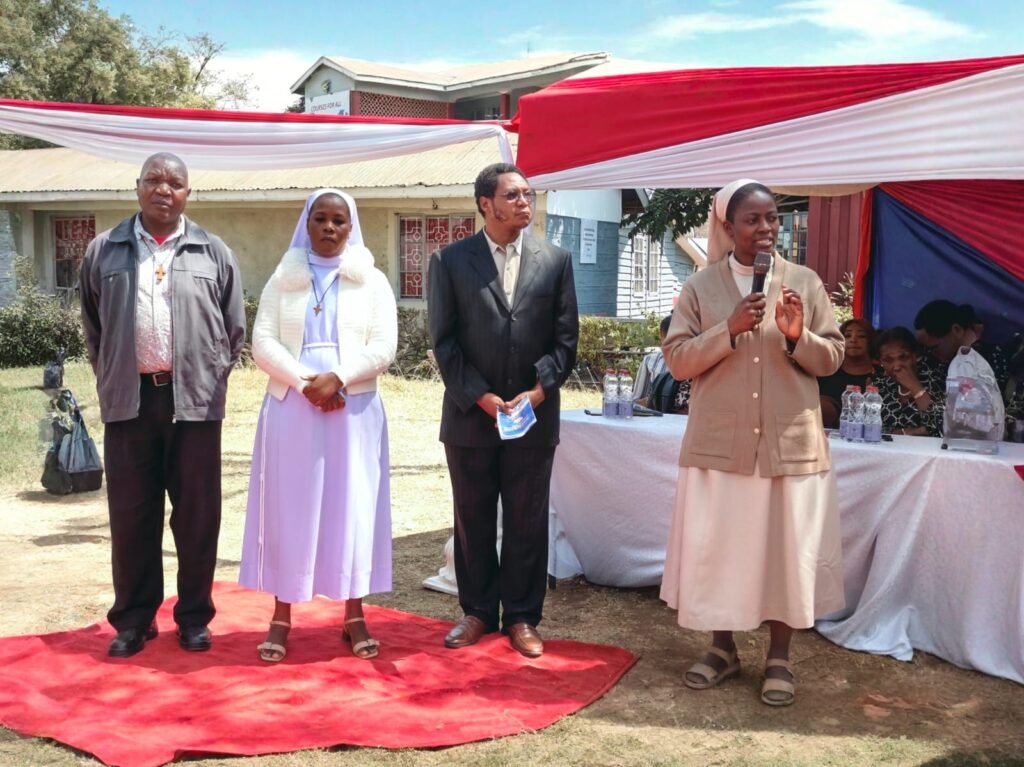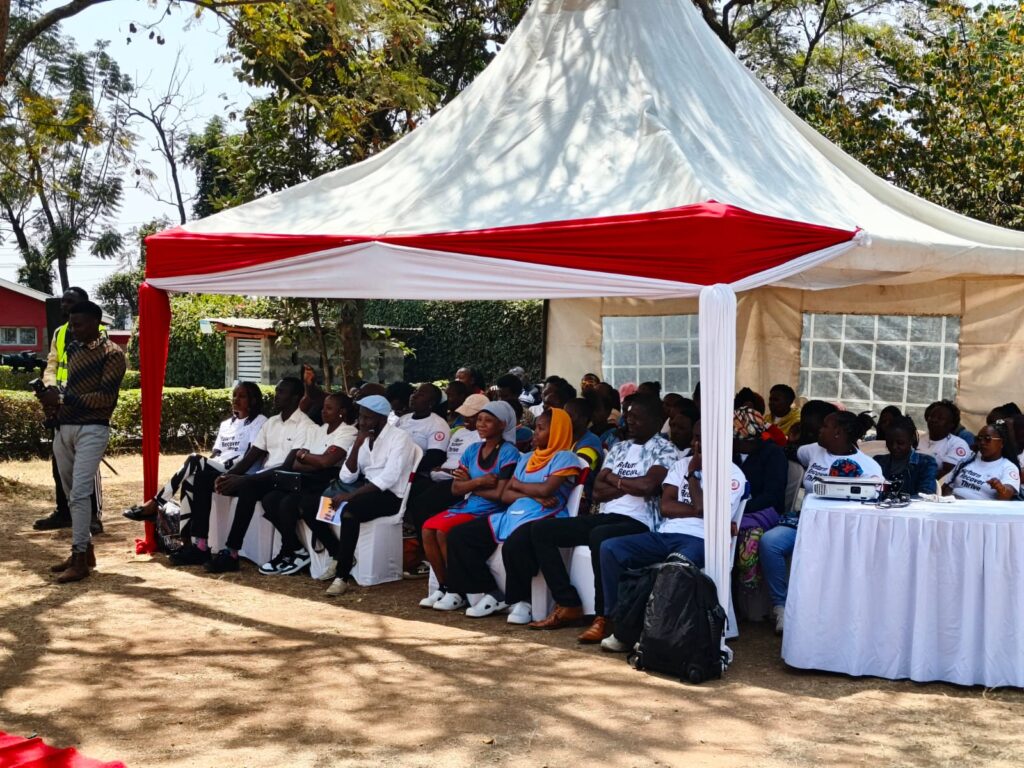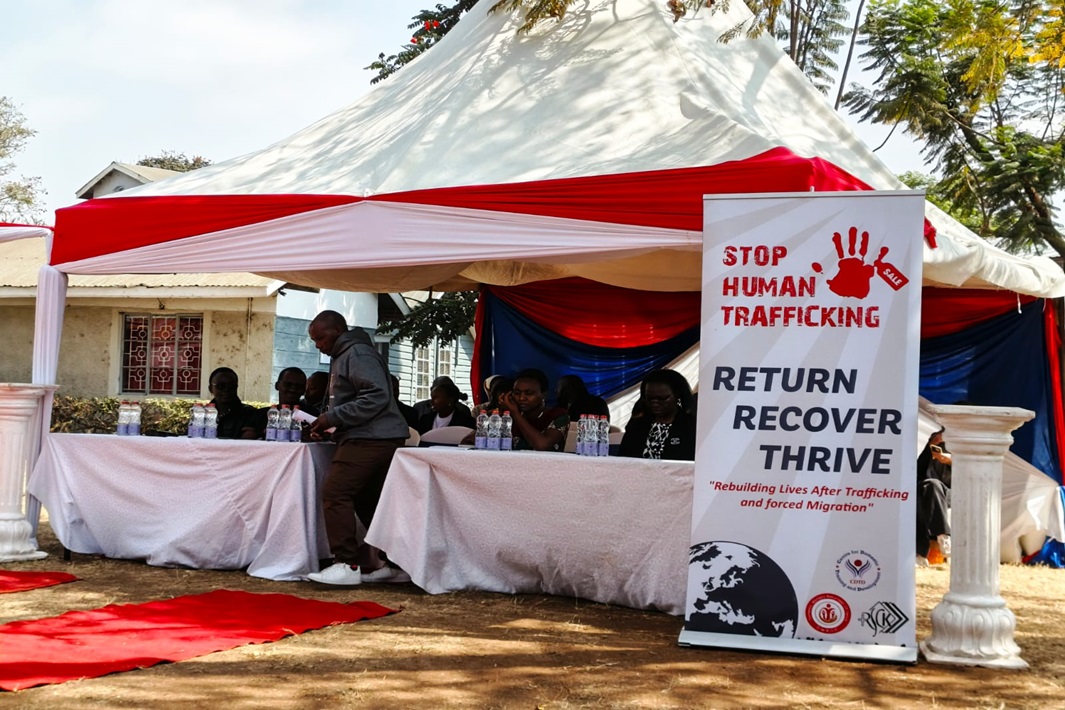By Paschal Norbert
NAIROBI, JULY 25, 2025 (CISA)- Kenya joined the global community in marking the World Day Against Trafficking in Persons 2025 under the theme “Rebuilding Lives After Trafficking and Forced Migration.” The event, however, celebrated annually and globally on July 30, was hosted at the East African Institute of Homecare Management.
It brought together survivors, government officials, faith-based organizations, and civil society actors in a united front to celebrate the resilience of returnees and advocate for safe and dignified labour migration policies.
The event was spearheaded by the Centre for Domestic Training and Development (CDTD), in collaboration with the Religious Superiors’ Conference of Kenya (RSCK), the Association of Sisterhoods of Kenya (AOSK) through Talitha Kum Kenya, and the Domestic Workers Returnees of Kenya (DWROK). Representatives from the Ministry of Labour, Ministry of Gender and Affirmative Action, and the State Department for Diaspora Affairs added government weight to the day’s engagements.
Opening the forum, CDTD Executive Director Edith Murogo emphasized that the day was not only about raising awarenes

s, but about acknowledging the bravery and tenacity of migrant workers and survivors of trafficking.
Representing the Catholic Church and the Religious Superiors’ Conference of Kenya (RSCK), Fr Nicholas Makau, IMC, assured returnees of the Church’s continuous support.
“The Catholic Church remains a home with open doors for all returnees,” he said, adding that Talitha Kum, a global network of consecrated women combating trafficking, was one of the Church’s strong arms in this mission.
He was joined by Br Julius Awino, BSJ, the RSCK Secretary General, who stood in solidarity with the survivors and underscored the need for continuous accompaniment of vulnerable populations.
Sr Mercy Amwai, Director of Talitha Kum Kenya, spoke passionately about the mission of the organization, highlighting its work in prevention, protection, and partnership.
“We work to eliminate the root causes of trafficking through education, awareness, and spiritual accompaniment,” she explained. “Each survivor’s story is a call to action for the Church and society.”
On the issue of recruitment and migration, Mr Vincent Ombati, representing registered recruiting agencies, urged prospective migrant workers to avoid informal brokers and unverified travel arrangements.
“Know the difference between legal and illegal recruitment,” he warned. “There’s a government-run website, NEAMIS (National Employment Authority Integrated Management System). That’s where you find accredited agents. Don’t take shortcuts. Avoid sub-agents who lure you with promises but end in exploitation.”
He cautioned returnees and prospective migrants against reusing old contacts without verification, “Even if someone took you abroad before, confirm they’re still accredited. Do not assume. Always double-check. Go directly to licensed offices, not through middlemen.”

Ombati acknowledged past failures in destination countries but recognized the ongoing reforms.
“We’ve come a long way,” he said. “Markets that were once volatile have shown remarkable improvement. The number of crises we’re handling has significantly reduced.”
Ms Emma Gicheha, representing the State Department for Diaspora Affairs, delivered a compelling keynote speech grounded in real-life encounters with distressed Kenyans abroad.
“I handle welfare and rights of our citizens abroad,” she explained, adding “We receive calls, emails, and letters from families whose loved ones are stranded- passports expired, stuck in airports, mistreated by employers. Our embassies step in to help resolve such cases.”
She outlined the department’s four-fold mandate: protection, engagement, empowerment, and prosperity: “Our role is to ensure that any Kenyan leaving the country for work does so safely and with dignity. Labour migration isn’t new, it’s global. But we must do it right.”
Gicheha warned against accepting seemingly generous offers, “Some of you are told it’s free to travel, but believe me, it’s never free. You pay the price later. If the deal is too good, think twice. Ask questions. Is the agency licensed under the National Employment Authority? Do they have a physical office?”
Recalling cases like the recent rescues from Myanmar, she emphasized vigilance. “If someone approaches you with a job offer, ask: what’s your company’s name? Where is your office? These are red flags if they cannot answer.”
As the event drew to a close, the resounding message was clear: survivors must not only be helped to return but supported to recover and ultimately thrive. The call to action was rooted in compassion, vigilance, and collaboration—from government to Church, civil society to the private sector.
The commemoration concluded with solidarity pledges and testimonies from survivors who are now rebuilding their lives, supported by organizations such as CDTD, Talitha Kum, and DWROK. Their stories served as powerful reminders of why this day matters—and why the fight against trafficking must be relentless.
